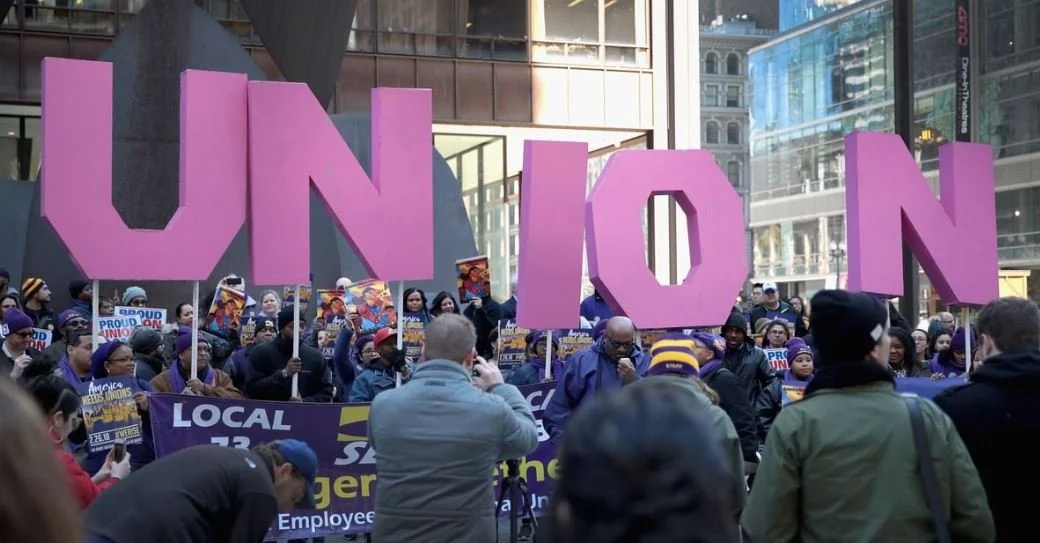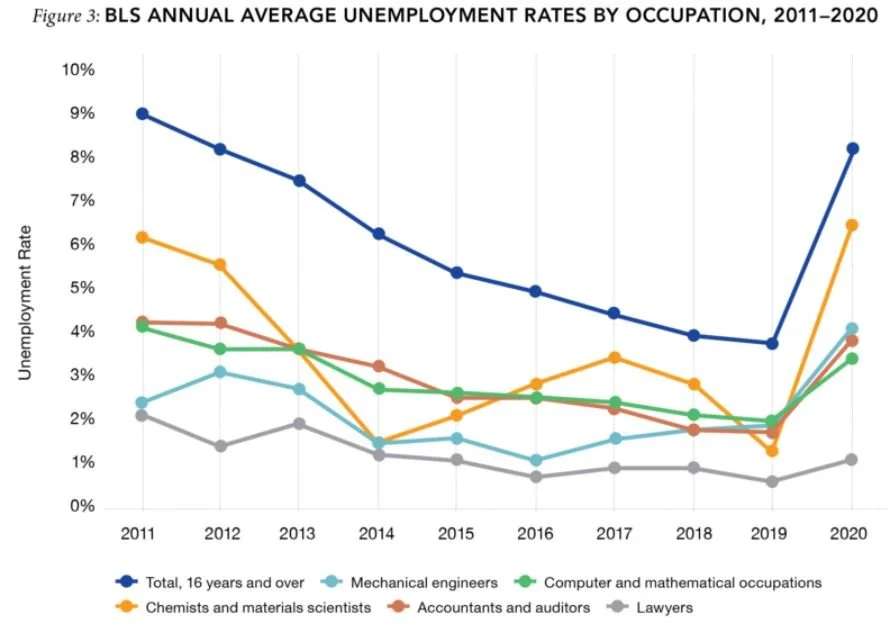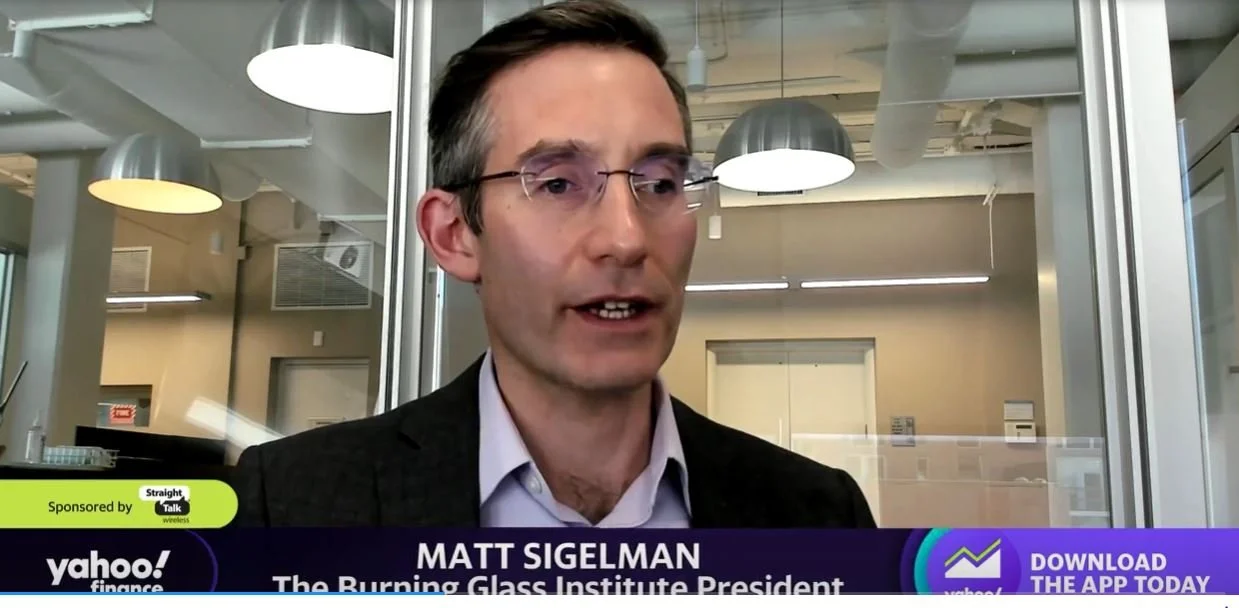News
Articles and op-eds featuring Burning Glass Institute research
Featured Articles
COMPUTERWORLD: Skills-based hiring continues to rise as degree requirements fade
February 24, 2023
By Lucas Mearian
Skills-based hiring continues to rise as degree requirements fade
A growing number of organizations are dropping traditional college degree requirements in favor of skills gained through alternative methods — and soft skills that are more innate than learned.
More employers are leaving behind college degree requirements and embracing a skills-based hiring approach that emphasizes strong work backgrounds, certifications, assessments, and endorsements. And soft skills are becoming a key focus of hiring managers, even over hard skills.
Large companies, including Boeing, Walmart, and IBM, have signed on to varying skills-based employment projects, such as Rework America Alliance, the Business Roundtable’s Multiple Pathways program, and the campaign to Tear the Paper Ceiling, pledging to implement skills-based practices, according to McKinsey & Co.
“So far, they’ve removed degree requirements from certain job postings and have worked with other organizations to help workers progress from lower- to higher-wage jobs,” McKinsey said in a November report.
Skills-based hiring helps companies find and attract a broader pool of candidates who are better suited to fill positions the long term, and it opens up opportunities to non-traditional candidates, including women and minorities, according to McKinsey.
At Google, a four-year degree is not required for almost any role at the company — and a computer science degree isn't required for most software engineering or product manager positions. “Our focus is on demonstrated skills and experience, and this can come through degrees or it can come through relevant experience,” said Tom Dewaele, Google’s vice president of people experience.
Similarly, Bank of America has refocused its hiring to use a skills-based approach. “We recognize that prospective talent think they need a degree to work for us, but that is not the case,” said Christie Gragnani-Woods, a Bank of America global talent acquisition executive. “We are dedicated to recruiting from a diverse talent pool to provide an equal opportunity for all to find careers in financial services, including those that don’t require a degree.”
Hard skills, such as cybersecurity and software development, are still in peak demand, but organizations are finding soft skills can be just as important, according to Jamie Kohn, research director in the Gartner Research’s human resources practice.
Soft skills, which are often innate, include adaptability, leadership, communications, creativity, problem solving or critical thinking, good interpersonal skills and the ability to collaborate with others.
“Also, people don’t learn all their [hard] skills at college,” Kohn said. “They haven’t for some time, but there’s definitely a surge in self-taught skills or taking online courses. You may have a history major who’s a great programmer. That’s not at all unusual anymore. Companies that don’t consider that are missing out by requiring specific degrees.”
A lessening of 'degree discrimination'
From 2000 through 2020 “degree discrimination,” cost employees who were skilled through alternative routes 7.4 million jobs, according to Opportunity@Work, a Washington-based nonprofit promoting workers who are skilled through alternatives routes. Alternative routes include skills learned on the job, in the military, through training programs, or at community colleges, for example.
“They are among our country’s greatest under-valued resources — the invisible casualties of America’s broken labor market — where low-wage work is often equated with low-skill work and the lack of a degree is presumed to be synonymous with a lack of skills,” Opportunity@Work explains on its site.
Over the past few years, however, job postings with a degree requirement have dropped from 51% of jobs in 2017 to 44% in 2021, according to the Burning Glass Institute….
TECHSPOT: Did you know you might not need a degree to get a top tech job?
February 17, 2023
By Kirstie McDermott
The college route isn't for everyone: it's eye-wateringly expensive, for one thing. In America, the average cost of attendance for a student living on campus at a public four-year university is $25,707 per year or $102,828 over four years, according to Education Data Initiative.
The numbers are even bleaker for out-of-state students, who pay $43,421 annually, or $173,684 over four years of education. Private, non-profit students pay a huge $218,004 over four years.
More figures estimate that those who are unable to work full-time while studying stand to lose a median annual income of $42,068, and once students' graduate, they are paying an average of $2,186 in interest each year – with the average student borrower spending about 20 years paying off their loans.
Move away
Within tech, there is an increasing move away from requiring prospective candidates to have a college degree. Research from Harvard Business School and The Burning Glass Institute found that in November 2022, 41% of U.S.-based job postings required at least a Bachelor's degree – a 5% drop from early 2019…
HR DIVE: As skills become obsolete at a ‘breathtaking’ pace, risk and project management remain solid L&D investments
February 10, 2023
By Ginger Christ
Dive Brief:
Skills like risk management and project management are solid investments because the cost to develop these skills is high but the payoff can last as long as a person’s entire career, according to a Feb. 9 Skills Compass Report 2023 from Coursera and The Burning Glass Institute.
“Thirty-seven percent of the average job’s skills have been replaced just over the past five years,” Matt Sigelman, president of the Burning Glass Institute, said in a blog post. “Such a breathtaking pace of change makes it very difficult to determine which skills to invest in or how different training options will pay off.”…
CFO DIVE: Unions lose clout even amid high-profile organizing gains
January 20, 2023
By Jim Tyson
Dive Brief:
The share of U.S. workers with union membership fell to a record low last year even as labor organizers scored high-profile wins at Microsoft, Starbucks, Amazon.com and other companies.
Among wage and salary workers, 10.1% were members of unions last year compared with 10.3% in 2021 and 20.1% in 1983, the Labor Department said. Unions lost ground proportionally in 2022 as the total number of workers grew by 5.3 million, or 3.9%.
“On average, industries and occupations with low rates of unionization are growing faster than ones with high rates of unionization,” according to Gad Levanon, chief economist at the Burning Glass Institute. Also, employees at new businesses may be less likely to be unionized than older ones.
Dive Insight:
Unions have failed to stem both a long-term decline in proportional membership and an erosion in real wages. Indeed, in recent years “the wages of non-union workers have been rising much faster than for union workers,” Levanon said, citing Labor Department data…
WASHINGTON POST: Opinion: Larry Hogan’s legacy includes a bright idea for the labor force
January 18, 2023
By Charles Lane
Wednesday is Inauguration Day in Annapolis, where Democrat Wes Moore will be sworn in as the governor of Maryland, replacing Republican Larry Hogan, who was term-limited after serving two four-year stints. It’s a moment of transition from one party to another and a historic milestone: Moore, elected by a landslide in November, is the first Black man to hold the state’s highest executive office.
Yet in one significant sense it will also be a day of continuity. A Moore aide confirms to me that the new governor will maintain an innovative Hogan policy, announced in March, whereby Maryland dropped the college-degree requirement for half of its 38,000 state jobs. Hogan appears to have been the first governor to open so many positions to workers sometimes described as “Skilled Through Alternative Routes,” or STARs, a term coined by advocates of the concept.
Hogan struck a blow for the notion that a bachelor’s degree does not automatically represent job-relevant skills and experience and that there are other ways — community college, military service, apprenticeship — to obtain them. “It’s time to debunk the fiction that a prestigious degree is the only key to the American dream,” Hogan wrote in an Oct. 4 Wall Street Journal op-ed. Among adults at least 25 years old in 2021, 62.1 percent lacked a four-year degree, according to the Census Bureau.
The private sector had already noted the upside of hiring STAR workers. Major companies that have selectively dropped college-degree requirements include Google, IBM and Delta Air Lines, according to the Journal. So, to a modest degree, had the federal government. As of November, 41 percent of open positions nationwide called for a four-year degree, down from 46 percent in 2019, according to the Burning Glass Institute, a think tank that analyzes labor-market trends.
In large part, employers are expanding searches for middle- or even high-skilled workers beyond holders of bachelor’s degrees because the tight labor market is forcing them to do so.
According to a February 2022 Burning Glass study, however, the trend is probably permanent, as employers realize that — especially for middle-skilled jobs — they have been too often treating the four-year degree as what Harvard Business School labor economist Joseph Fuller calls “a proxy” for soft skills, such as a capacity to learn and succeed in a structured environment. In a 2017 study, Fuller and co-author Manjari Raman, also of Harvard, analyzed more than 26 million job postings and found significant discrepancies between companies’ routine demand for a degree and the actual educational credentials of employees who were working in those positions….
WALL STREET JOURNAL: Employers Rethink Need for College Degrees in Tight Labor Market
November 26, 2022
By Austen Hufford
The tight labor market is prompting more employers to eliminate one of the biggest requirements for many higher-paying jobs: the need for a college degree.
Companies such as Alphabet Inc.’s Google, Delta Air Lines Inc. and International Business Machines Corp. have reduced educational requirements for certain positions and shifted hiring to focus more on skills and experience. Maryland this year cut college-degree requirements for many state jobs—leading to a surge in hiring—and incoming Pennsylvania Gov. Josh Shapiro campaigned on a similar initiative.
U.S. job postings requiring at least a bachelor’s degree were 41% in November, down from 46% at the start of 2019 ahead of the Covid-19 pandemic, according to an analysis by the Burning Glass Institute, a think tank that studies the future of work. Degree requirements dropped even more early in the pandemic. They have grown since then but remain below prepandemic levels…
FORTUNE: Now is the best time to get your dream job if you don’t have a college degree
November 29, 2022
By Jane Thier
In just about every job, workers’ skills are more important than where they went to college—or, as is increasingly the case, whether they went to college at all…
24/7 WALL ST: 22 Jobs With the Fastest-Changing Skill Requirements
November 17, 2022
By Angelo Young
Certain jobs evolve with time -- sometimes the nature of the job changes, and sometimes the necessary knowledge does. The demands from workers therefore can shift as well, in some cases quite rapidly, requiring workers to update their skills fairly frequently in response to the changing environment. Workers in such jobs often develop expertise in new areas -- be it through pursuit of new tasks at work or through additional learning.
“Day by day, skill by skill, the basic building blocks of a job are repositioned, until the role looks much different than it did just five years ago,” said a recent report from The Burning Glass Institute, a Boston-based research group. “Yet the job title -- and the worker in the job -- may remain the same.”
These days, this is especially true of jobs directly involved with the digital environment, from coding to social media. (Also see, these are the highest paying jobs you can get without a college degree.)
A computer scientist might need to learn a new programming language that did not exist just a few years earlier. Data engineers might want to pursue new advances in the related area of data science, making them more valuable to employers for having skill sets in two closely aligned fields. Advertising managers a decade ago needed less experience in online marketing, such as through websites and video streams, than they do today.
Jobs whose skill expectations change rapidly over a short period of time are considered to have a high rate of so-called skill disruption. This rate of disruption varies by job type. For instance, the skill disruptions for a music recording artist is lower than for a website administrator.
To identify the jobs at greatest risk of skill disruption, 24/7 Wall st. reviewed the skills disruption index for 678 occupations from the May 2022 report "Shifting Skills, Moving Targets, and Remaking the Workforce," published by The Burning Glass Institute, a research organization focused on labor in the United States. The report, which covered 2016 through the third quarter of 2021, measures the amount of skill change in an occupation on a scale from 0-100, with 0 being the least amount of disruption and 100 being the greatest.
About 37% of the top 20 skills requested by employers have changed from 2016 to 2021, according to the report. Jobs with the highest level of skill disruption include industrial psychologist, industrial designer, financial quantitative analyst, and robotic engineer. As these job titles suggest, jobs with high rates of skill disruption tend to pay better than those with lower rates of disruption. (Here are 65 jobs with six figure salaries.)
For data engineers, the occupation that scores 100 on the index, close to 75% of the top skills often required for that occupation have changed over the five-year review period.
WALL STREET JOURNAL: Labor Market Mystery: Where Are the Older Gen Z Workers?
Economists search for theories on why fewer people ages 20 to 24 are working or seeking a job
Nov. 13, 2022
By Bryan Mena
The exodus from the labor force in the pandemic’s early months has mostly reversed, but one group remains oddly absent: people in their early 20s.
For people over age 15, the labor-force participation rate—the share of people employed or actively seeking a job—dropped from an average of 63.1% in 2019 to 61.7% in 2021, and recovered to 62.2% in October. But for people ages 20 to 24, participation that averaged 72.1% in 2019 stood at just 70.8% in October.
That equals a shortfall of about half a million workers in their early 20s when comparing the current size of that workforce with 2019 levels…
ISSUES IN SCIENCE AND TECHNOLOGY: A STEM Workforce Debate
ISSUES IN SCIENCE AND TECHNOLOGY:
A STEM Workforce Debate
Fall 2022 Issue
Matt Sigelman
Long out of fashion, industrial policy has come back into vogue, amid bipartisan concerns over economic and military vulnerabilities in an intensifying sphere of global competition. Underlying much of this discussion is the fear that America lacks sufficient STEM talent to carry forward its legacy of technological innovation and to maintain its lead over China. In his article, Ron Hira raises important questions about whether such concerns are supported by the facts.
Hira acknowledges that the lack of availability of detailed data represents a constraint to more effective analysis of imbalances between the supply and demand of STEM talent. As he points out, traditional public data only allow for analysis at the aggregate level, and typically only through a sectoral lens. Just as in any field, STEM roles differ in the skills they require and, correspondingly, in the availability of needed talent, as illustrated in Hira’s article by the contrast between life scientists and software engineers. In the same way that a sectoral lens is insufficient to analyze labor shortages for specific STEM roles, looking only at categories of STEM roles is insufficient to analyze the availability of specific skills in demand in the market. There is no single “skills gap” in the market, but rather different gaps for different skills. Overall, conferred degrees and employer demand in what the Bureau of Labor Statistics refers to as “computing and mathematics” occupations may be in balance, but the pipeline for specific talent can still be severely anemic at the level of specific roles.
This is even more the case when we consider the question of whether existing programs of study are aligned to industry demand at the skill level. For example, while universities may be conferring more than enough STEM degrees to meet demand at the categorical level, these university programs may not be teaching enough of the specific skills that are required by industry, whether those be technical skills such as cloud architecture or soft skills like teamwork and collaboration. Significant gaps between skills taught and skills sought can be as problematic as broader imbalances—but less perceptible…
YAHOO FINANCE: Employee flexibility 'is a lot of the reason why workers stay': Burning Glass Institute president
Yahoo Finance Video
Employee flexibility 'is a lot of the reason why workers stay': Burning Glass Institute president
Burning Glass Institute President Matt Sigelman joins Yahoo Finance Live to discuss the best companies to work at to grow your career and what employees are prioritizing.
Video Transcript
- Welcome back. In today's labor market, you might not need a bachelor's degree to work your way up the ladder and land a strong job. A new index measures which companies are most likely to create economic mobility for workers without college degrees.
Joining us now, we want to bring in Matt Sigelman. He's president of the Burning Glass Institute for today's installment of Career Control, which is brought to you by Straight Talk Wireless. Matt, it's great to see you. So let's get into the index and what you found. The American Opportunity Index. You revealed which large companies are doing it best in terms of advancing workers in the workplace. What did you find?
MATT SIGELMAN: Well, Seana, what we found is that where you work matters a lot for whether you move ahead in your career. We constructed an index to be able to essentially create a yardstick for the American dream. A lot of us are concerned about intergenerational mobility. In other words, do you better than your parents? If you were born in the 1940s, about 90 plus percent of people were going to do better than their parents. If you're born in the 1980s, that was down to at best even odds.
And so what we wanted to look at is the role that companies play in facilitating mobility for their workers. We tracked 3 million workers of the Fortune 250 over five years-- sorry. From 2017 to 2021. And we looked at how they progress, both within their companies and beyond their company.
- And who are the companies that did best? Are they concentrated in particular sectors?
MATT SIGELMAN: So it was actually very interesting to see how broad spread good practice is. If you look at the top companies, you're looking at folks like AT&T on the one hand. Amex. You're looking at Cisco, but also companies like PG&E, Southwest Airlines, International Paper. Across the top 50 companies in America in terms of they're creating opportunity for workers, they represented 21 of the 27 industries that we track…
FINANCIAL TIMES: OPINION: Skills gaps will force companies to do right by their compatriots
By Oren Cass
FINANCIAL TIMES
October 17, 2022
Employers who profited from cheap foreign labour cannot now gripe at having to train local workers
Business leaders who complain constantly of “talent shortages” or “skills gaps” may, in fact, have only themselves to blame. The perceived weaknesses among their staff may be the result of overambitious or flawed plans. Anyone can see the folly in trying to hire thousands of experienced biochemists at minimum wage to develop cutting-edge drugs. The problem is not a biochemist shortage; the problem is the bad idea. Equally foolish is the software executive who expects an unlimited supply of eager coders, or the plant manager who believes well-trained technicians will line up at his door…
New research published on Thursday by the Burning Glass Institute, Harvard Business School, and the Schultz Family Foundation…show[s] how much better employers can do. The American Opportunity Index uses data from millions of online job ads and CVs to analyse the career paths of US workers, typically without college degrees, through the nation’s 250 largest publicly traded companies. The index focuses on three dimensions of opportunity that employers provide: access (hiring of entry-level workers and those without college degrees), pay (median wage offered in each occupation) and mobility (how far and fast workers are promoted, how long they stay and how successful they are moving on to other companies)…
THE DALLAS MORNING NEWS: AT&T, HF Sinclair, Southwest Airlines among best for career mobility without a degree
By Natalie Walters
The Dallas Morning News
October 17, 2022
A new study identifies the companies that give workers the best career mobility without requiring a college degree, and three Dallas companies made the list.
The project, led by Philadelphia think tank Burning Glass Institute, used publicly available data to assess the 250 largest U.S. public companies. They call the rankings “a corporate scorecard of worker advancement.”
Topping the list is Dallas-based telecom giant AT&T. Other Dallas firms in the top 10 were oil company HF Sinclair and Southwest Airlines.
The researchers looked at career histories, job postings and salary sources to determine the companies that provide the most help for career advancement for workers in roles that don’t require a college degree.
The five-year study measured accessibility, or who is able to join the company; wages, or how well they’re paid; and mobility, or how high up the worker advances either at their original employer or a new one…
WALL STREET JOURNAL: Want to Get Ahead? Pick the Right Company
By Lauren Weber and Theo Francis
The Wall Street Journal
October 14, 2022
Want to Get Ahead? Pick the Right Company
The best places to advance your career, get groomed for bigger opportunities elsewhere and find job stability, as determined by a new study. A college degree isn’t necessarily required.
Retail workers at Gap Inc. are significantly more likely to become managers than at other companies in their industry. Apple Inc. is among the best places to work if you want to land a bigger job elsewhere. For employees seeking security, few companies offer better job stability than Exxon Mobil Corp.
These are among the findings of a new five-year analysis of career mobility for millions of U.S. workers led by Philadelphia think tank Burning Glass Institute, focusing on jobs that don’t necessarily require a college degree. Certain companies, it turns out, excel at helping workers in these jobs move up the career and pay ladder. At other firms careers can stagnate, even within the same industry. New skills at those firms don’t always translate into promotions, higher wages or more opportunities to advance…
CNN BUSINESS: Opinion: The Fed doesn’t have a choice anymore. Get ready for a recession
By Gad Levanon
CNN Business: Opinion
October 7, 2022
To many economists and analysts, the US economy has represented a paradox this year. On the one hand, GDP growth has slowed significantly, and some argue, even entered a recession. On the other hand, overall employment growth has been much stronger than normal.
While GDP declined at an annualized rate of 1.1% in the first half of 2022, the US economy added 2.3 million jobs in the last six months, far more than in any other six-month period in the 20 years prior to the pandemic.
This tight labor market – and the rapid wage growth it has spurred – is causing inflation to become more entrenched. The Consumer Price Index, which measures a basket of goods and services, was 8.3% year-over-year in August. That’s lower than the 40-year high of 9.1% in June, but still painfully high. To address it, the Federal Reserve is likely to drive the economy into a recession in 2023, crushing continued job growth.…
TECHPOINT AFRICA: University degrees are becoming less important for high paying jobs, here’s how you can take advantage
By Oluwanifemi Kolawole
Techpoint.africa
September 14, 2022
Per a 2022 Tech Work Report, tech founders have become more flexible with their hiring requirements such that a university degree might not be necessary to fill a middle-skill or even high-skill role.
More prominent companies are also taking this stand for many reasons, the most obvious being a shortage of tech talent.
Potential hires can still be at a disadvantage if they lack the required skill and experience.
Besides the combination of qualifications that an employer would typically specify for a role, recruiters also have specific skills they often look out for during recruitment. Passion, potential to improve, ability to communicate and collaborate, and an impressive track record are only a few.
Usually, this track record would highlight academic achievements, especially when the candidate is only just beginning their career journey. As is standard practice, an excellent graduate degree makes a good first impression when it comes to job search. But it seems the conversation is changing….
COMPUTERWORLD: Q&A: From parkourist to data analyst — how upskilling launched a tech career
By Lucas Mearian
Senior Reporter, Computerworld
September 13, 2022
Bailey Shaw, a 23-year-old parkour expert with no tech background or college degree, was able to land an entry-level job with a software vendor where he spent the next year learning low-code development tools. He's now a junior data analyst.
With the unemployment rate hovering just above 2% for tech workers, companies are focusing their recruitment efforts on skills-based hiring and dropping college degree requirements.
Among middle-skilled occupations, the openings that require college degrees are for the most part similar to those for which no degree is required, according to a recent study by Harvard Business School’s Project on Managing the Future of Work and the Burning Glass Institute.
“Jobs do not require four-year college degrees. Employers do,” the study noted….
CHICAGO TRIBUNE: Matt Sigelman and Ken Mehlman: Airline meltdowns are the canary in the coal mine
Matt Sigelman and Ken Mehlman: Airline meltdowns are the canary in the coal mine
By Matt Sigelman and Ken Mehlman
August 31, 2022
For would-be vacationers, this has been the summer of our discontent. In the wake of the pandemic, severe staffing shortages have triggered a crush of disruption: Flight cancellations abound while check-in lines snake out the terminal door. Travelers wonder when the chaos will abate.
But what if this isn’t just a temporary hiccup? This summer’s air travel meltdown could well be the canary in the coal mine for the labor shortages we may soon experience across the economy as boomers retire, population growth slows and training lags. To avoid further shortages, we must rethink how we invest in workers and start planning ahead.
Across sectors, today’s problems have been a long time coming. For those who think travel headaches are simply the product of pent-up wanderlust, consider this: According to the labor market analytics firm Lightcast, job openings for pilots have grown 72% since 2016 while the number of pilots at work has grown only 12%, a profound gap that demonstrates just how many jobs are going unfilled…
AUDACY: More companies hiring based on skills than education
More companies hiring based on skills than education
By Joe Hiti
August 11, 2022
With the United States economy adding more than 500,000 jobs across nearly every sector in July, new research suggests that education isn't as important as a candidate's skills are.
The research comes from The Burning Glass Institute, which has found that jobs requiring a four-year degree have steadily decreased over the last half-decade. A survey from the Harvard Business Review in April also found the same trend.…
CNBC: These 3 hacks can help you land your dream job right now, according to career experts
These 3 hacks can help you land your dream job right now, according to career experts
By Morgan Smith
August 3, 2022
The latest labor market forecasts are confusing at best: amidst fears of a looming recession and layoffs at high-profile companies, the number of new hires and people who quit their jobs in June remained incredibly high, according to the latest JOLTS report.
Still, it’s not a bad time to find your dream job. “Hiring has slowed a bit, but the good news is that it’s still a job-seeker’s market, and there are still a ton of opportunities out there,” LinkedIn career expert Blair Heitmann tells CNBC Make It, adding that hiring has been especially strong in health care, media, construction and financial services industries as of late.
Even if the economy takes a turn for the worse, the typical recession lasts less than 18 months — so, ultimately, “there’s a light at the end of a tunnel, and you’ll be able to find a job … it might just take a little longer,” career coach Emily Liou says.
Building your confidence in the job search and knowing exactly what hiring managers are looking for can help speed up the process of landing your dream job, regardless of the state of the economy.
Here are three tips from career experts to maximize your search…




















